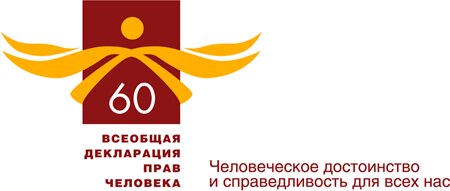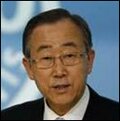Human rights in Belarus is an abstract concept, not a working tool of power

On 10th December the international community celebrated the 60th anniversary of the signing of the Universal Declaration of Human Rights. The document adopted by the United Nations General Assembly in 1948, in 30 articles establishes the basic human rights and freedoms.
The
declaration had a recommendatory nature. However it formed the basis for a
number of international instruments governing relations between the countries
it has been incorporated into national constitutions and it has been translated
into more than 300 languages.
 In his statement on the
occasion of the 60th anniversary of the Declaration the UN
Secretary-General Ban Ki-moon stressed that today's problems no less complex
than those faced by the authors of the document. “And as ever, the most
vulnerable continue to be on the frontlines of hardship and abuse.. Rights, and
especially their violation, must hold the whole world in solidarity. On this
Human Rights Day, it is my hope that we will all act on our collective
responsibility to uphold the rights enshrined in the Universal Declaration”, said
the UN Secretary-General.
In his statement on the
occasion of the 60th anniversary of the Declaration the UN
Secretary-General Ban Ki-moon stressed that today's problems no less complex
than those faced by the authors of the document. “And as ever, the most
vulnerable continue to be on the frontlines of hardship and abuse.. Rights, and
especially their violation, must hold the whole world in solidarity. On this
Human Rights Day, it is my hope that we will all act on our collective
responsibility to uphold the rights enshrined in the Universal Declaration”, said
the UN Secretary-General.
Jose Manuel Barroso, the European
Commission President, admitted on the anniversary day that he was every time
surprised by the revolutionary nature of the Declaration. Through all the
decades, the document retained its relevance and importance.
Benita Ferrero-Waldner, the
EU commissar for Foreign Policy stressed in a statement that the promotion and
protection of human rights is an integral part of the EU policy, and it will
continue to contribute to this common cause.

On the international scene,
 A Human Rights defender
Oleg Gulak, leader of the Belarusian Helsinki Committee, said on 10 December
that the Universal Declaration of Human Rights was still relevant 60 years after
its adoption. Thanks to the Declaration “human rights” is not a scientific
term, but an important element of modern civilization, without which it would
be impossible to implement international and national policies.
A Human Rights defender
Oleg Gulak, leader of the Belarusian Helsinki Committee, said on 10 December
that the Universal Declaration of Human Rights was still relevant 60 years after
its adoption. Thanks to the Declaration “human rights” is not a scientific
term, but an important element of modern civilization, without which it would
be impossible to implement international and national policies.
“Precisely due to the fact
that the human rights have become such an important issue, there is a problem
of politicization of them”, said Gulak.
“Politicians tend to
misapply whatever tools they have. Some hide behind allegations of double
standards to dispense with human rights, others speak about the rights and
freedoms in order to exert pressure», believes a human rights activist.
According to him, this current trend is a call upon the human rights community
and civilization as a whole because many politicians were now willing to review
these standards.
According to the head of the
BHC, it is essential that human rights remained on the agenda of a dialogue
between
Alexander Yaroshuk chairman
of Belarusian Congress of Democratic Trade Unions, agrees with Mr. Gulak. The trade union leader
believes that the human rights situation in
 how the issue has been
politicized is a litmus paper, which shows, “how sincere and consistent
political authorities of the country are ready to follow the path of the democratic
reforms”.
how the issue has been
politicized is a litmus paper, which shows, “how sincere and consistent
political authorities of the country are ready to follow the path of the democratic
reforms”.
The 12 recommendations on
which
The celebration taking
place itself, according to a trade unionist, has a direct bearing on the
Belarusian workers because human rights are equated with the rights of workers.
For example, the International Labor Organization since 2001 was following the
situation with the respect for workers' rights in
“Human rights is the
cornerstone of any kind, whether democracy or reform of political system”, the
head BCDTU is convinced.
 Gennady Davydko, the Vice-Chairman
of the Commission on Human Rights, National Relations and Media of the House of
Representatives of the National Assembly of Belarus said that the declaration
is a recommendatory nature, but each country should strive to ensure “as close as
possible to the legislation and its application”.
Gennady Davydko, the Vice-Chairman
of the Commission on Human Rights, National Relations and Media of the House of
Representatives of the National Assembly of Belarus said that the declaration
is a recommendatory nature, but each country should strive to ensure “as close as
possible to the legislation and its application”.
This idea is an utopia, however
an important one, because the basic interests of the state are the well-being
and freedom of every citizen, said the MP. However, he said, “no country can be
completely free and exist without looking back at something”.
In addition, human rights
and freedoms are not always commensurate with the capabilities of people and
the country. Thus everyone has the right to housing, however not everyone can
afford it, the way he or she likes. There is the freedom of movement, but one
may have no money to travel, there is the right to work and there is
unemployment, and so on, said Davydko. “Belarusians have more rights than
duties”, - believes the MP.
According to the Deputy
Chairman of the Commission, for one to judge about the compliance with the human
rights is “as hard as to judge about a movie or play”. “This is not a sport
there are no indicators or bars. It is the same with the notion of democracy -
whatever the weather can be called political”, - said the MP. He stressed that
there are violations of human rights in the EU countries as well.
Roman Yakovlevsky, a political
observer, explained that the States cover their non-compliance with the human
rights with different interpretation of those terms. For example, one country may
be at the forefront of social rights, however prefers to forget about political
rights.

Expert agrees that there
are human rights violations in the
Therefore, the issue of
compliance by
 The knowledge about the Human
Rights should be a natural part of human learning, summarises an expert on the Belarusian
culture Maxim Zhbankov. However he says that in order for this knowledge to
work, it should be not only the heritage of the citizens, but also of the social
and political structures.
The knowledge about the Human
Rights should be a natural part of human learning, summarises an expert on the Belarusian
culture Maxim Zhbankov. However he says that in order for this knowledge to
work, it should be not only the heritage of the citizens, but also of the social
and political structures.
“Today in
Marina Rakhley
-
03.01
-
07.10
-
22.09
-
17.08
-
12.08
-
30.09






















